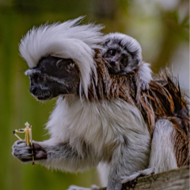
The zoo recently started caring for the endangered species again.
A baby cotton-top tamarin has been born at Chester Zoo, a cause for celebration for conservation of the species, which is critically endangered.
The baby, born to parents Treat and Leo, is reportedly being cared for excellently by its parents, and is the first cotton-top tamarin to be born at Chester Zoo in 22 years.
Siobhan Ward, primate keeper at the zoo, commented on the new arrival: “We strongly suspected that the mother, Treat, was pregnant from regular monitoring of her weight and seeing her belly swell.
“But it was a fantastic surprise nonetheless to see a tiny little ball of fluff clinging onto her back one morning!
“The baby is far too tiny and a bit early on to determine gender at the moment. Both parents will carry the baby for around the next six months – but it’s actually dad who’s been doing most of the carrying so far, passing it to mum for feeds while he stays protectively close by. Both Treat and Leo have taken to parenthood brilliantly.
“It’s incredibly special to be able to see the little one so soon after its birth and after opening its eyes for the first time to take in the world.”
Native to a small area in northern Colombia, only five per cent of the cotton-top tamarin's original habitat remains intact due to mass deforestation, and only 2,000 of the primates exist in the wild.
Also a huge threat to the creatures, the illegal wildlife trade continues to be interested in cotton-top tamarins and their unique look.
Nick Davis, deputy curator of mammals at the zoo, explained: “The cotton-top tamarin is an exquisite animal but sadly it's one of the most endangered primate species on the planet.
“It's a highly threatened species because its wild habitat has been destroyed by commercial logging for the agriculture, paper and timber industries, and these miniature monkeys are also regularly found in the illegal wildlife trade.”
“It wasn’t that long ago that these miniature primates were seen as quite a common species, so their dramatic demise over the last few years shows just how a species thought to be safe can change so rapidly.
Due to their complex social and environmental needs, cotton-top tamarins should never be kept as pets. They’re highly intelligent animals that can live for around 25 years when safe in zoos.”
Images (C) Chester Zoo



 The latest
The latest